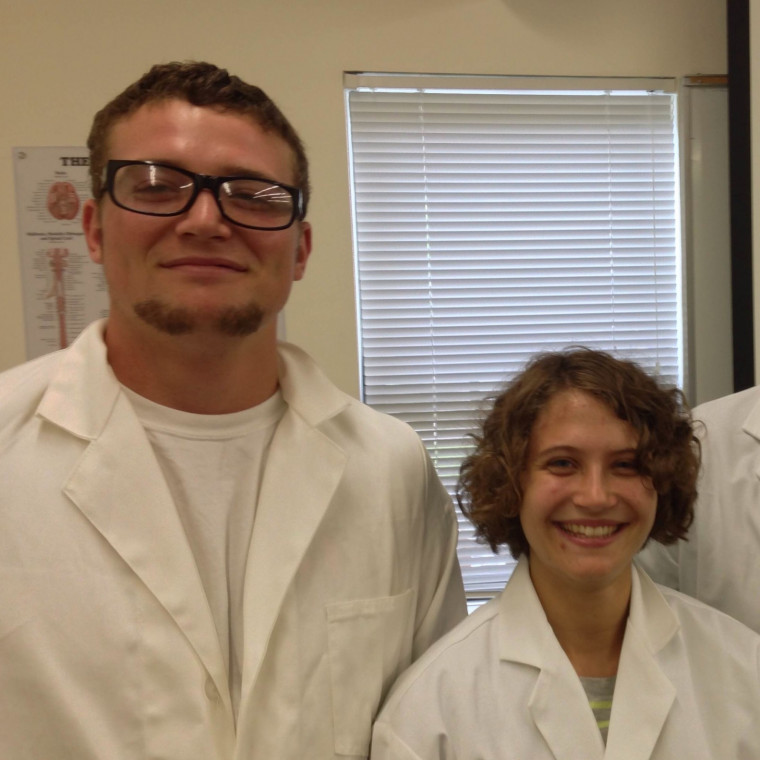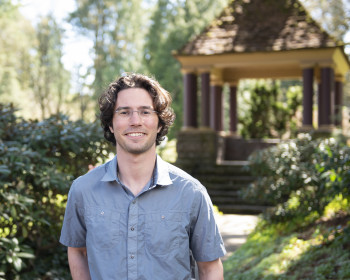Summer student research: Food on the brain
Open gallery

During the summer months, Lewis & Clark students remain closely engaged with their fields of study, and many make meaningful contributions to scholarship by collaborating with faculty on innovative research.
Emma Cook ’15 and Tate Sellers ’16 have been working with Assistant Professor of Psychology Todd Watson to study interaction between cognitive inhibition and high calorie foods. They reflect on this experience in the following Q&A.
What are you researching?
We are conducting research on cognitive inhibition in two different age groups—young adults and preschool-aged children. Cognitive inhibition is the mind’s ability to block irrelevant stimuli and behavioral impulses. Our studies will be focusing on the interaction between cognitive inhibition and high calorie foods. We want to know if it is harder to control behavioral responses to high calorie foods than to low calorie foods. We are also looking at how other behavioral and psychological factors tie into this relationship.
What initially sparked your interest in this project, and how does it relate to your previous coursework?
What really sparked our interest in this project is the overlap between eating behaviors and substance misuse. Being able to investigate the natural reward processing and cognitive control pathways in the brain may lead to greater insight for other processes that rely on the same pathways, such as addiction. We also appreciated the opportunity to be mentored by Professor Watson.
This project relates to our previous coursework by requiring us to reexamine neurocognitive processes that we have have studied in the past. We have both taken Professor Watson’s Brain and Behavior course, and we found the basics of neuroscience to be very interesting. Additionally, we wanted to learn more about the biological and cognitive aspects of psychology.
How has your Lewis & Clark education been enhanced by close collaboration with faculty?
With this project, we are able to have unique educational experiences that aren’t possible in other contexts. So far, we’ve learned how to prep the electrodes for an electroencephalography (EEG) recording, gotten familiar with the software used for an EEG, and discovered how to program experimental tasks. The knowledge we gain from our research is not usually accessible in a classroom setting and will be very useful to us in the future.
Does your research have potential to be applied in the real world or to influence other work in your field?
Our research is closely applicable to the real world. As most people know, there is a growing problem with obesity in our country, and our findings can tell us more about individual differences in brain function when inhibiting environmental food cues. This study—and others like it—can give us more insight into how the brain works and, more specifically, into cognitive processes behind food and drug addiction.
How will this research experience hopefully impact your future studies or professional pursuits?
While neither of us is completely sure about what we want to do when we graduate, our summer research is providing us with new experiences and knowledge that we can apply to our futures regardless of what we decide do. This opportunity gives us a chance to explore what professional research is like, and it allows us to see if research would be a fitting career choice. Many of the skills we’re acquiring, such as how to use a typical brain imaging technique like an EEG, could certainly be useful in future neuroscience research.
About the Rogers Science Research Program
The John S. Rogers Science Research Program allows students to pursue graduate-level research in the natural and mathematical sciences. It emphasizes strong communication skills, requiring students to publicly present their findings. This summer, more than 50 students are being sponsored to study such topics as memory formation, cybersecurity, and the impact of nicotine on flies.
“We’re not asking you, ‘What’s the answer?’ We’re saying, ‘What’s the question?’” said Michael Broide, director of the Rogers program and chair of the physics department. “I think what sets our program apart is that regardless of what project you are on, we’re all going to come together as a group to present what we’re doing in as accessible a way as possible. In science, it’s such an important skill to be able to explain cogently what you’re doing.”
Students make their final research presentations at the Rogers summer science poster session, held in conjunction with the Science Without Limits Symposium. Scheduled for September 17, the poster session is free and open to the public.
Katrina Staaf ’16 contributed to this story.
Psychology Department Neuroscience Program Rogers Summer Research Projects
More Newsroom Stories
Public Relations is located in McAfee on the Undergraduate Campus.
MSC: 19
email public@lclark.edu
voice 503-768-7970
Public Relations
Lewis & Clark
615 S. Palatine Hill Road MSC 19
Portland OR 97219

